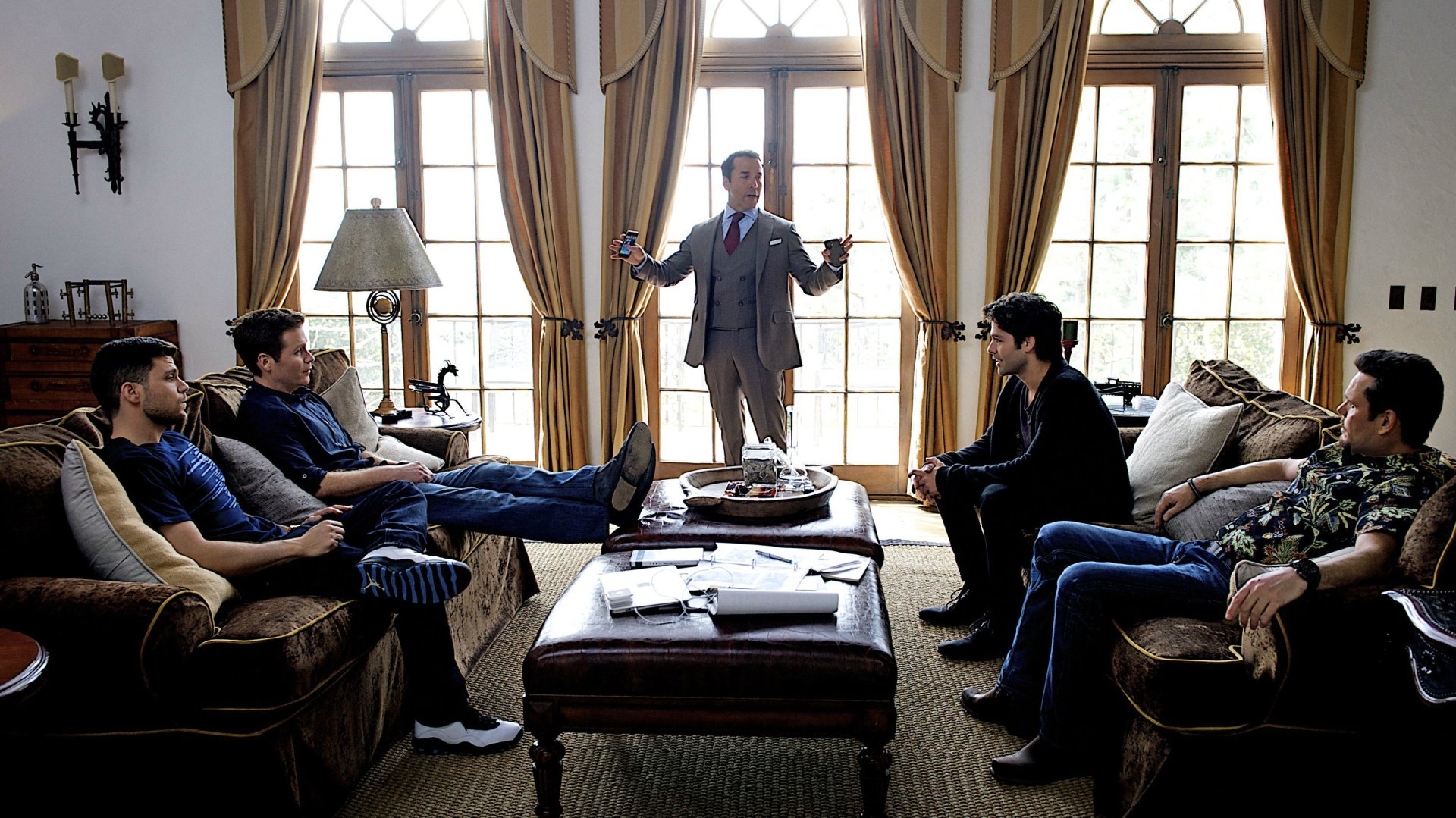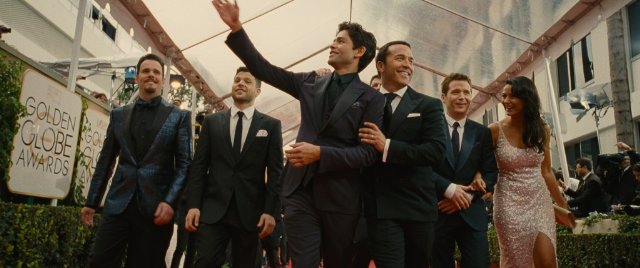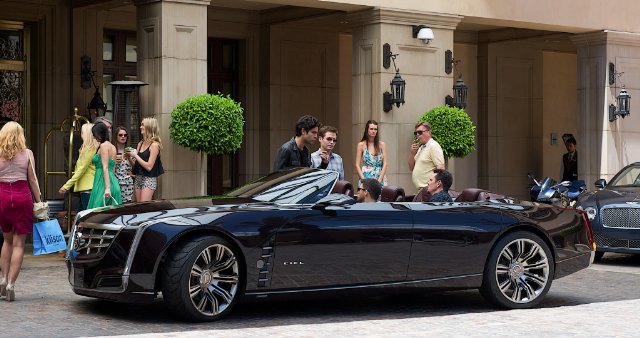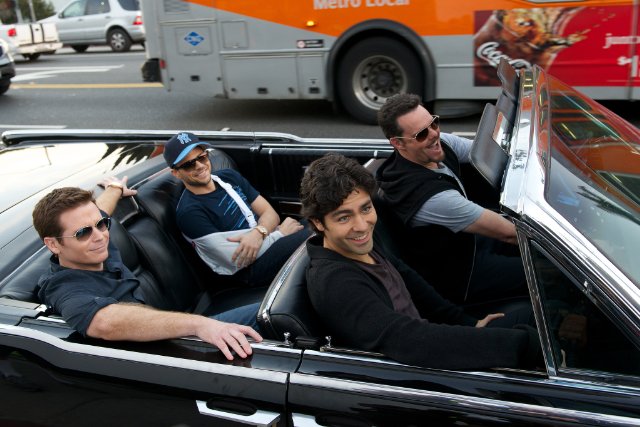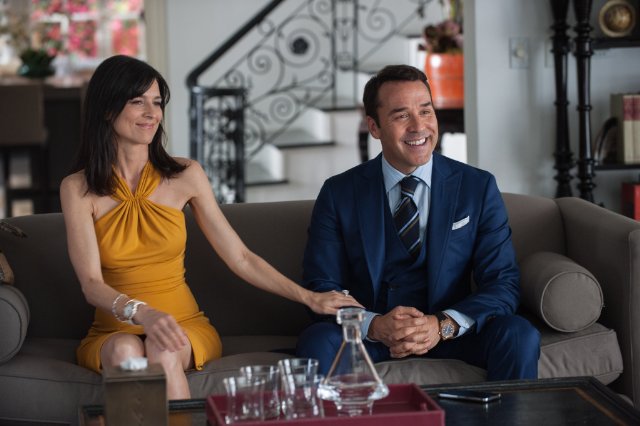Sometime in between July 2004, when Entourage premiered on HBO, and this week’s premiere of the characters’ theatrical curtain call, the definition of a guilty pleasure changed. That phrase used to be attached to something one might actually feel guilty about enjoying. Today it is used to refer to anything one likes that isn’t “highbrow.”
 Warner Bros.
Warner Bros.My own complicated, conflicted, and guiltily pleasurable relationship with Entourage wrapped up this week. There might be other movies, but I’ve moved on. Send me a postcard from the 20th anniversary, maybe. I wish these characters well, and I hope they grow into the interesting, rounded characters that they never quite managed to become in the show’s eight-year run. But for now, they are stuck, and I am tired of waiting for them to grow up.
For those who didn’t watch the show during its run, the film offers a quick synopsis in the form of a Piers Morgan profile piece. Four friends from a rough East Coast neighborhood move to Hollywood. Vincent Chase (Adrian Grenier) is the breakout movie star represented by superagent Ari Gold (Jeremy Piven). His older brother, Johnny “Drama” (Kevin Dillon), is an established B-list actor whose star is quickly eclipsed by his younger brother.
Vince’s two childhood friends Eric (Kevin Connolly) and Turtle (Jerry Ferrara) comprise the entourage. Eric begins as Vince’s personal manager and eventually becomes an agent himself. Turtle is the driver who is mostly just along for the ride, although he does branch out on some of his own business ventures late in the show’s run. That is why he is portrayed as independently wealthy in the Entourage movie.
Because the show and film are executive-produced by Mark Wahlberg, it has always tacitly accepted that Entourage is semiautographical. (Wahlberg grew up in a rough neighborhood, has an older brother who does mostly television work, and has a longtime friend/associate named Eric.) The show’s constant procession of cameos from celebrities—some playing themselves and others playing thinly disguised versions of actual Hollywood figures—helped Entourage walk the fine line between satire and documentary. Does Matt Damon really harass other stars for charitable donations? Would Anna Faris really drive home from a work out wearing only a towel? Was high-strung studio head Harvey Weingard (Maury Chaykin) a dead-on impersonation of another Harvey W., a cartoonish lampoon, or a composite character?
 Claudette Barius / Warner Bros.
Claudette Barius / Warner Bros.If Entourage’s ability to skewer the Hollywood culture it depicted justified representing that culture in all its blingy, bawdy, coked-up, sexed-up excess, any ability to take it seriously was predicated on Vince and Eric’s position as outsiders. They were those who were puzzled, bemused, and at times disgusted by the lives crashing and burning all around them. (Remember when Vince took his mother to a movie premiere because he didn’t have a date?)
As the comedic equivalents of Michael Corleone, Vince and Eric espoused the notion, at least for a while, that their different values would inoculate them from the soul-destroying effects of the toxic industry they found themselves in. Or maybe like Tony Soprano, they longed to convince themselves—and we longed for them to convince us—that one could have all the fruits of sin and yet not be fundamentally, internally corrupted by enjoying them. Loyalty to friends and family (of choice) is indeed a high virtue, one that serves as an adequate counterpart to the hedonic pulls of celebrity and carnal pleasure.
But to the extent Entourage was ever really about that conflict of values—and I’ve had a hard time persuading skeptical friends and family that it was—the examination of that conflict was thwarted by the serial nature of television. It is hard to develop characters when you don’t know for sure when their story will end.
As a result, television deals with arrested development, tending to recycle the same formulaic conflicts arising from static situations. Rarely does serial television move beyond its initial premise. I think that's one of the main reasons why the first three seasons of Entourage were so much stronger than the last four or five. Vince could only hover on the edge of stardom for so long. You can’t be the outsider forever.
Towards the end of the series’ run and into the movie Entourage felt at cross purposes. On the one hand, the film wanted to repeat the show’s mantra that boys’ bonds were stronger than any adult pressures or considerations; on the other, it wanted to show the costs of success and the weight of celebrity. It wanted to continue to laugh at the extremes of Hollywood, even as it continued to use those extremes as the external markers of Vince’s “success.”
By the end of the show’s eight-year run, Vince had been arrested for cocaine possession, been to rehab, done a High Fidelity-like video of all the women who had “loved” him (in order to impress a journalist who rightly dismissed him as an insecure narcissist trying to charm her for good publicity), and faked a drug test to save a movie contract. Eric had engaged in revenge sex with the stepmother of his purported soulmate. Ari’s wife had left him and filed for divorce. (They reconciled in the series finale.)
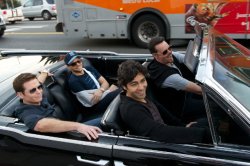 Claudette Barius / Warner Bros.
Claudette Barius / Warner Bros.In other words, to the extent the series developed the characters at all, it did so by suggesting that the success they craved (and in which we vicariously indulged) was just a mirage. They took only small steps towards maturity, but they involved reaffirming that essential relationships were more important than commercial success.
That’s one reason why the first half of the Entourage movie is so disappointing. In order to put the characters in familiar situations and allow them to hit the familiar beats, the film has to walk back the implied development of the series finale.
I wanted to see the next chapter in these characters’ lives, not watch them replay past successes. I wanted to see how Vince handled marriage, not find out that he got a quickie annulment. I wanted to find out how Eric and Sloane finally got passed their crippingly unhealthy on-again-off-again commitment phobia, not watch them cycle through another iteration of it.
Mostly, I wanted to see how Ari and Melissa (the criminally underappreciated Perrey Reeves) rebuilt their lives after finally choosing happiness over success. In perhaps the most depressing part of the film’s preamble, we find out that Ari ended up taking the head-of-studio job, and that he and Mrs. Gold have slid back into the familiar pattern of talking about family values while putting family on the back burner for one last project.
Still, while I was disappointed in the focus of the film, I can’t say that I was surprised. Show creator and film director Doug Ellin is no dummy, and it’s not hard to see how recycling the formula is always a safer bet than tweaking it. We all remember New Coke, right?
But if I can’t dock Ellin and company points for playing it safe, I can for doing so while claiming that it is the characters’ authenticity and originality that makes them worth attending to in the first place. When a minor character berates one of the gang for being “a typical Hollywood d*****bag,” the insult is supposed to sting, but not stick. Yet we’ve arrived at the point where the characters are indistinguishable from the caricatures and lifestyle they initially contrasted themselves to.
 Claudette Barius / Warner Bros.
Claudette Barius / Warner Bros.Nowhere is this more tellingly revealed than in a throwaway scene early in the film where Eric, now dating someone else, takes Sloane to birthing class and gets irate when Chad Lowe starts flirting with her. Isn’t there something perverse about his coming on to Sloane even as he has his arms around his pregnant partner? When Sloane informs Eric that the other couple is “not together,” he wants to know what they are doing at a birthing class. Sloane replies by asking how the other couple is any different from them. Eric thinks for a moment and replies that “it’s a f***ed up town.”
At a certain point, though, don’t you have to admit that the town is comprised of the people who live in it?
Maybe it’s not the town, Eric. Maybe it’s you.
Caveat Spectator
Entourage is rated “R” for pervasive sex, gratuitous nudity, and obscene language. There are at least two scenes of simulated intercourse, one involving (implied) prostitutes servicing each other in a male’s hotel room. There is plenty of casual (female) nudity, including Eric’s girlfriend skinny-dipping and models going topless on Vince’s yacht.
Ari, who self-identifies as Jewish throughout the show, is shown praying to God that Vince’s movie will be good. When another character asks why he is praying, since he doesn’t “believe” in God, he says, “I do for the good stuff.” The film, like the culture it depicts, seems far more areligious than antireligious, but Ari’s glibness about God may rub some viewers the wrong way.
Lloyd, Ari’s longtime assistant, asks Ari to give him away at a marriage ceremony with his gay partner. Interestingly, in the show, Lloyd (Rex Lee) once told Ari in a casual aside that his parents had known he was gay since he was 9 and that it was no big deal to them; in the film, he claims his father never spoke to him after his coming out. This little bit of revisionist history is telling, perhaps, in that it feels like a tacit admission that certain elements of the show, including Ari’s over-the-top, homophobic abuse of his assistant, haven’t aged well. The film portrays Ari’s jibes regarding Lloyd’s sexuality as all just in fun amongst people who know they love and are loved by each other, but in the show, Ari is portrayed as genuinely cruel to Lloyd, leading the latter to quit his employ for a season. I don’t think any fan of the show believed that deep down, Ari hated Lloyd, but there was actually something radical and culturally important about the way the show depicted Ari grappling with his genuine unease at Lloyd’s sexuality—and Lloyd choosing to look past the bombastic bluster to nurture Ari’s baby steps towards accepting gay people. That the film refuses to acknowledge this relationship’s history is one of several ways in which it feels defanged, opting for safer, more familiar comedic tropes over any honest (and at times painful) depictions of cultures clashing.
Kenneth R. Morefield (@kenmorefield) is an associate professor of English at Campbell University. He is the editor of Faith and Spirituality in Masters of World Cinema, Volumes I, II, & III, and the founder of 1More Film Blog.

